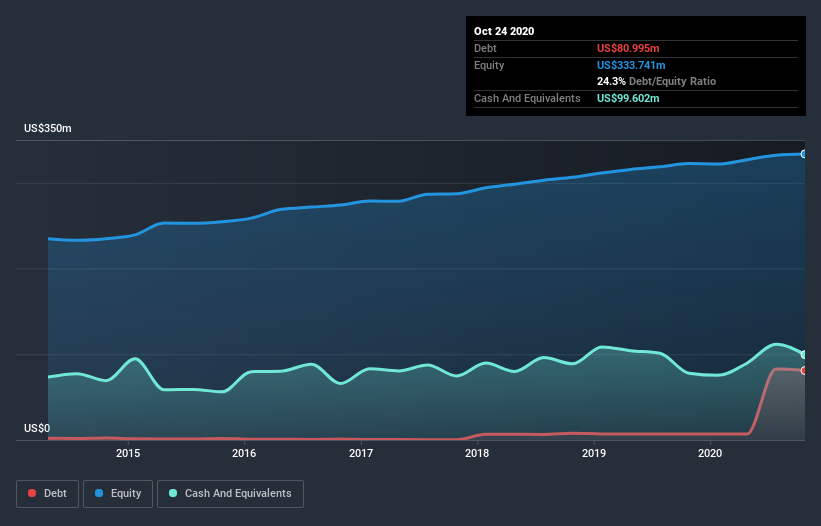- United States
- /
- Food and Staples Retail
- /
- NasdaqGS:VLGE.A
Is Village Super Market (NASDAQ:VLGE.A) A Risky Investment?

Legendary fund manager Li Lu (who Charlie Munger backed) once said, 'The biggest investment risk is not the volatility of prices, but whether you will suffer a permanent loss of capital.' So it seems the smart money knows that debt - which is usually involved in bankruptcies - is a very important factor, when you assess how risky a company is. As with many other companies Village Super Market, Inc. (NASDAQ:VLGE.A) makes use of debt. But the real question is whether this debt is making the company risky.
When Is Debt A Problem?
Debt assists a business until the business has trouble paying it off, either with new capital or with free cash flow. If things get really bad, the lenders can take control of the business. However, a more frequent (but still costly) occurrence is where a company must issue shares at bargain-basement prices, permanently diluting shareholders, just to shore up its balance sheet. By replacing dilution, though, debt can be an extremely good tool for businesses that need capital to invest in growth at high rates of return. The first step when considering a company's debt levels is to consider its cash and debt together.
See our latest analysis for Village Super Market
How Much Debt Does Village Super Market Carry?
You can click the graphic below for the historical numbers, but it shows that as of October 2020 Village Super Market had US$81.0m of debt, an increase on US$7.04m, over one year. But it also has US$99.6m in cash to offset that, meaning it has US$18.6m net cash.

How Strong Is Village Super Market's Balance Sheet?
We can see from the most recent balance sheet that Village Super Market had liabilities of US$154.9m falling due within a year, and liabilities of US$413.2m due beyond that. On the other hand, it had cash of US$99.6m and US$26.4m worth of receivables due within a year. So it has liabilities totalling US$442.1m more than its cash and near-term receivables, combined.
When you consider that this deficiency exceeds the company's US$311.3m market capitalization, you might well be inclined to review the balance sheet intently. Hypothetically, extremely heavy dilution would be required if the company were forced to pay down its liabilities by raising capital at the current share price. Village Super Market boasts net cash, so it's fair to say it does not have a heavy debt load, even if it does have very significant liabilities, in total.
Fortunately, Village Super Market grew its EBIT by 2.4% in the last year, making that debt load look even more manageable. The balance sheet is clearly the area to focus on when you are analysing debt. But it is Village Super Market's earnings that will influence how the balance sheet holds up in the future. So if you're keen to discover more about its earnings, it might be worth checking out this graph of its long term earnings trend.
Finally, a business needs free cash flow to pay off debt; accounting profits just don't cut it. Village Super Market may have net cash on the balance sheet, but it is still interesting to look at how well the business converts its earnings before interest and tax (EBIT) to free cash flow, because that will influence both its need for, and its capacity to manage debt. Over the last three years, Village Super Market recorded free cash flow worth a fulsome 87% of its EBIT, which is stronger than we'd usually expect. That puts it in a very strong position to pay down debt.
Summing up
While Village Super Market does have more liabilities than liquid assets, it also has net cash of US$18.6m. The cherry on top was that in converted 87% of that EBIT to free cash flow, bringing in US$42m. So we are not troubled with Village Super Market's debt use. The balance sheet is clearly the area to focus on when you are analysing debt. But ultimately, every company can contain risks that exist outside of the balance sheet. Be aware that Village Super Market is showing 3 warning signs in our investment analysis , and 1 of those doesn't sit too well with us...
Of course, if you're the type of investor who prefers buying stocks without the burden of debt, then don't hesitate to discover our exclusive list of net cash growth stocks, today.
If you decide to trade Village Super Market, use the lowest-cost* platform that is rated #1 Overall by Barron’s, Interactive Brokers. Trade stocks, options, futures, forex, bonds and funds on 135 markets, all from a single integrated account. Promoted
New: Manage All Your Stock Portfolios in One Place
We've created the ultimate portfolio companion for stock investors, and it's free.
• Connect an unlimited number of Portfolios and see your total in one currency
• Be alerted to new Warning Signs or Risks via email or mobile
• Track the Fair Value of your stocks
This article by Simply Wall St is general in nature. It does not constitute a recommendation to buy or sell any stock, and does not take account of your objectives, or your financial situation. We aim to bring you long-term focused analysis driven by fundamental data. Note that our analysis may not factor in the latest price-sensitive company announcements or qualitative material. Simply Wall St has no position in any stocks mentioned.
*Interactive Brokers Rated Lowest Cost Broker by StockBrokers.com Annual Online Review 2020
Have feedback on this article? Concerned about the content? Get in touch with us directly. Alternatively, email editorial-team (at) simplywallst.com.
About NasdaqGS:VLGE.A
Village Super Market
Engages in the operation of a chain of supermarkets in the United States.
Adequate balance sheet average dividend payer.
Similar Companies
Market Insights
Community Narratives




